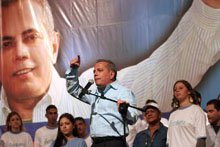According to defector accounts, Kim Jong Il endorsed counterfeiting not only as a way of paying for covert operations but also as a means of waging economic warfare against the United States, “a way to fight America, and screw up the American economic system,” as the North Korean specialist paraphrased it to me.
In a similar vein, according to Sheena Chestnut, a specialist on North Korea’s illicit activities who has also interviewed several key defectors, counterfeiting was seen as an expression of the guiding idea of the regime: the concept of juche. Often loosely translated as “self-reliance” or “sovereignty,” the idea of juche entails an aggressive repudiation of other nations’ sovereignty — a reaction to the many centuries in which Korea capitulated to its larger, more powerful neighbors. “It appears that counterfeiting actually contributed to the domestic legitimacy of the North Korean regime,” Chestnut told me. “It could be justified under the juche ideology and allowed the regime to advertise its anticapitalist, anti-American credentials.”
By 1984, as North Korea’s planned economy began to fall apart, Kim Jong Il, who by that time was effectively running much of the government, issued another directive, according to the North Korean specialist, who told me he has obtained a copy of the document. It explained that “producing and using counterfeit U.S. dollars” was a means, in part, for “overcoming economic crisis.” The economic crisis was twofold: not only the worsening conditions among the general population but also a growing financial discontent among the regime’s elite, who had come to expect certain perquisites of power. Counterfeiting offered the promise of raising hard currency to buy the elite the luxury items that they had come to expect: foreign-made cars, trips for their children, fine wine and cognac.
...
From all accounts, superb quality is a feature of much North Korean contraband: methamphetamine of extraordinarily high purity; counterfeit Viagra rumored to exceed the bona fide product in its potency; supernotes. It’s an impressive product line for a regime that can barely feed its people. When I discussed this with Asher, he let out a sigh. “I always say that if North Korea only produced conventional goods for export to the degree of quality and precision that they produce counterfeit United States currency, they would be a powerhouse like South Korea, not an industrial basket case.”
Better yet, read the whole thing - it's always good to be up to date on what Chavez's buddies are up to.

